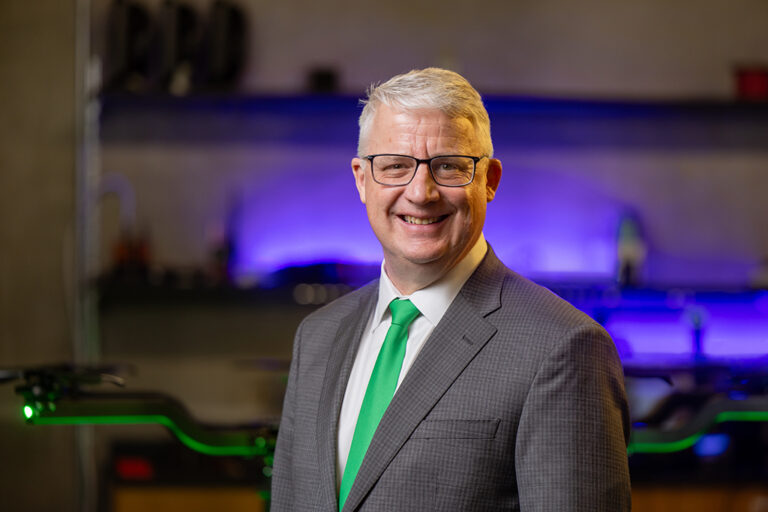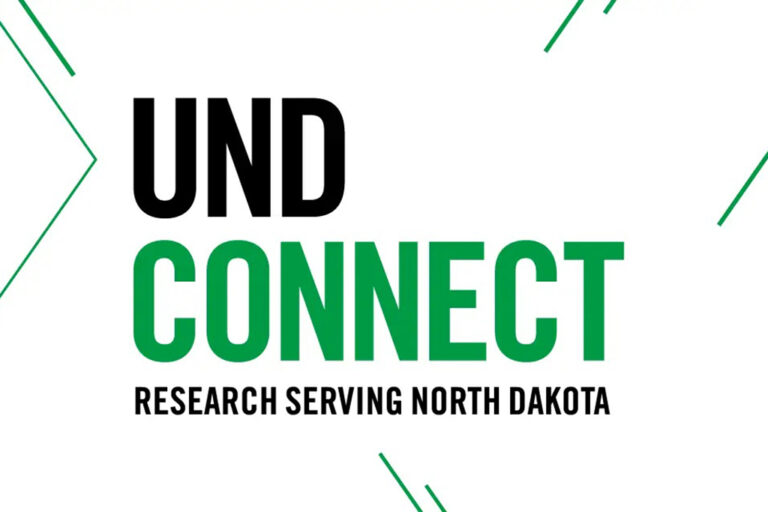Big day for ‘Big Data’
Signing ceremony announces $10 million UND investment in Big Data, hiring of six new computational scientists

Hesham El-Rewini, dean of the UND College of Engineering & Mines (CEM), looked like a proud father in the Memorial Union Ballroom recently.
His daughter, Zeinab, was set to receive her CEM diploma later in the day.
He also was excited for the dozens of other soon-to-be CEM grads. He beamed with delight during the “Order of The Engineer” pledging ceremony, in which students who earn engineering degrees receive special rings, and computer science students, also part of the College, get honorary gold pins, imprinted with “0s” and “1s” – the binary code – and basis for all things digital.
It was the perfect setting for even more good news – and UND President Mark Kennedy delivered.
Kennedy seized the moment by announcing the University will invest $10 million over six years in CEM, supplementing College resources to hire six new computational (Big Data) scientists. The new hires are intended to bolster the University’s standing in future-facing technologies such as artificial intelligence (A.I.), machine learning and cyber studies, technologies vital to the state’s economic health.
“We view this as a central resource for the University,” Kennedy said. “As many leaders in artificial intelligence have already said, ‘A.I. is the new electricity.’”
The investment over six years is far more than mere salary and benefits for the six scientists. Each would come with expertise and resources to apply computational expertise to research in all fields across campus as well as provide fertile ground for more post-docs, Ph.D.s and funded research opportunities.
The new hires will be part of a “Big Data hub,” to be housed in a renovated and teched-up Babcock Hall when completed, UND’s historic first home for engineering education, and right across the street from CEM’s current administrative headquarters.

Computational commitment
El-Rewini joined Kennedy, UND Vice President for Finance & Operations Jed Shivers and Vice President for Research & Economic Development Grant McGimpsey in a Friday morning signing ceremony to formalize the Big Data hub and other strategic initiatives.
“This is a special day for the College of Engineering & Mines, a special day for engineers and a special day for computer scientists on campus,” El-Rewini said.

UND Vice President for Academic Affairs & Provost Tom DiLorenzo joined the chorus of enthusiastic support for UND’s increased commitment to computational sciences.
“Big Data is vital to every field of study – from the arts and humanities to the bench sciences,” DiLorenzo said. “The College of Engineering & Mines, with its computer science expertise, may be the hub for these new computational efforts on campus, but there’s an expectation that this will also be a center of collaboration where all academic and research units can grow and flourish.”
Former UND Vice President for Research & Economic Development Grant McGimpsey, who played an instrumental role in University’s research growth over the past four years, was also a big proponent of more computational capabilities at UND. He’s also been the point person in shifting UND’s research focus to five Grand Challenges (unmanned systems, energy and sustainability, biomedicine, rural health, and Big Data) – areas in which UND excels and for which external funding opportunities are more abundant.
McGimpsey explained that the Grand Challenges are designed to be broad enough so any academic discipline on campus could synergistically attach their research and creative pursuits to them. That’s especially true for Big Data.
“Big Data is a very different Grand Challenge than the others,” he said. “The way I look at it is that computational research, algorithm development, data analytics all underpin the other four Grand Challenges.”

Paying off
The Grand Challenges coupled with other moves, such as more accurately accounting for research expenditures and reallocating $4 million for research seed money to attract more external funds, are strategic efforts to put UND on par with the highest-research-activity institutions in the nation (Carnegie R1 status).
Hiring computational scientists is an important next step for UND’s quest to join that elite group of 115 universities. And recent reports show the effort may be paying off.
In November, the National Science Foundation issued its updated Higher Education Research and Development report for FY ’17. UND ranked 151st, up 16 places from the last update.
“We are moving up the ranks, and with these additional hires, we should move up even further,” Kennedy said.
Kennedy credits VP Shivers with finding internal money to help fund the Big Data hires. Combined with the seed funding re-allocations, the University recently has committed about $14 million in internal investments to growing research.
Kennedy also has joined his counterpart at North Dakota State University, Dean Bresciani, emphasizing that commercialization efforts in the state are made more difficult without additional state support to adequately nurture research. The presidents used numbers from the latest New Economy Index to show that North Dakota ranks in the top 10 nationally for new start-ups but in the bottom 10 for resulting spin-off and commercialization activities.
They tout data that show start-ups are 10 times more likely to be successful with Initial Public Offerings, attracting venture capital and other fast-starting activities if they emerge from university research.
Kennedy sums it up with a home-grown analogy to strengthen the point.
“Without university research,” he said, “it’s like wanting the harvest without doing the hard work of planting.”


